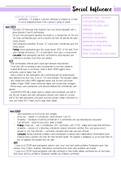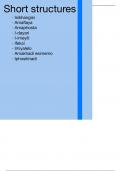Summary
Summary AQA A-Level Psychology Social Influence Notes
- Course
- Institution
- Book
These are detailed Revision Notes of the Social Influence Topic of AQA A-Level Psychology. They were written by me using a combination of the textbook and class notes. I will also be uploading the other topics and creating bundles. Topics Included: - Asch’s Research - Types and Explanations o...
[Show more]





